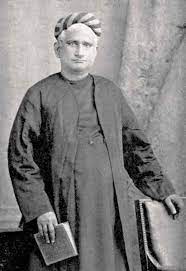
Bankim Chandra Chattopadhyay’s Bangalar Nobbyo Lekhokdiger Proti Nibedon (a request to new writers of Bengali), translated and introduced by Abdullah-Al-Musayeb.
The essay was originally written by Bankim Chandra Chattopadhyay (1838-1894), the celebrated Bengali novelist, poet, and essayist. It was first published in Prachar[1] in 1885 and later included in his book Bibidho Probondho[2]. Although this essay is written in Sadhu Bhasa[3], it has an all-time universal appeal due to its significance and originality of thought. In this essay, Bankim offers some advice for the aspiring writers, which are as follows:
1. Do not write solely to achieve fame, as it may hinder your growth as a writer and prevent your writing from achieving the success you desire. If your writing is good, success and fame will come automatically.
2. It is advised to avoid writing only for monetary gain. Though in Europe many writers successfully earn money through their craft and produce quality work, we have yet to reach that stage. When you write for profit, there is a tendency to prioritise entertainment over substance. Writing may lose its relevance and fail to meet its objectives when it considers the reading preferences and tastes of the average reader.
3. Writing with the intention to benefit society and humanity or to create art is commendable. However, those who write solely for personal gain or malicious intent may be regarded as no better than petty merchants like hawkers.
4. Articles that are false, sacrilegious, slanderous or written for private interest should be avoided as they are not beneficial to the society. Using the pen for purposes other than promoting truth and upholding dharma[4] is a sin; therefore, literature should focus on these objectives.
5. Do not publish what you write immediately. Leave it for some time, revise it, and you will surely find many mistakes in the article. Poetry, drama, and novels achieve special excellence if they are kept unpublished for a few years and revised afterward. But this rule does not apply to those engaged in the work of literary periodicals. Hence, periodicals can be degrading for the writer.
6. Intervening in matters beyond one’s purview is universally frowned upon, yet it remains a common transgression in periodicals that defy this norm.
7. Do not attempt to flaunt your knowledge, for actual knowledge reveals itself naturally and does not require overt demonstration. Endeavouring to display intellect can prove irksome to readers and undermine the work’s credibility. Although articles today often feature quotations in various languages like English, Sanskrit, French, and German, it is essential to refrain from quoting from languages you do not know properly or relying solely on the assistance from books.
8. Do not succumb to the allure of rhetoric and humour. Rhetoric or satire is sometimes required; if an author possesses these skills, they will arise spontaneously — if not, attempting to force them will prove unproductive. Nothing is as unappealing as an ill-timed or insincere use of rhetoric or a forced attempt at humour.
9. A conventional rule in aesthetics is that rhetoric or satire considered pleasing should be avoided. While I do not endorse this rule, I recommend determining the value of such passages by reading them aloud to friends repeatedly. If the work fails to draw the audience, the author may hesitate to share it again and ultimately choose to delete it from the final product.
10. Simplicity and lucidity are the best ornaments of language. An ideal writer is one who possesses the ability to effortlessly convey ideas to their readers through the use of concise and lucid language. This is because the primary objective of writing is to clarify concepts for the target readership.
11. Do not imitate others. For in imitation, flaws are picked up instead of strengths. Don’t even entertain the thought that I’ll write in a particular style just because other English, Sanskrit, or Bengali writers have done so.
12. Do not write what you cannot prove. Evidence may not always be required but having it on hand is usually a good idea.
13. Bangla literature is considered to be the lifeline of Bengal. So, the development of Bangla literature will be expedited if Bengali authors adhere to these guidelines.
[1] Announcement
[2] Variety of Essays, published volume 1 in 1876 and volume 2 in 1892.
[3] Formal Bengali used mainly for writing.
[4] Values
Bankim Chandra Chattopadhyay (1838 –1894) was a lawyer, novelist, poet, essayist and journalist. He authored Anandamath (1882), one of the earliest landmark novels of modern Bengali literature. He wrote and composed the highly popular Vande Mataram (I Praise you Motherland), a song used to inspire activists during the Independence Movement. Chattopadhayay wrote fourteen novels and many serious, serio-comic, satirical, scientific and critical treatises in Bengali. He has also written a novel in English called Rajmohan’s Wife(1864). He is referred to as the Sahitya Samrat (Literary Emperor) of Bengal
Abdullah-Al-Musayeb is an academic, researcher and translator. He can be reached at musayeb41@gmail.com
PLEASE NOTE: ARTICLES CAN ONLY BE REPRODUCED IN OTHER SITES WITH DUE ACKNOWLEDGEMENT TO BORDERLESS JOURNAL.
Click here to access the Borderless anthology, Monalisa No Longer Smiles
Click here to access Monalisa No Longer Smiles on Kindle Amazon International